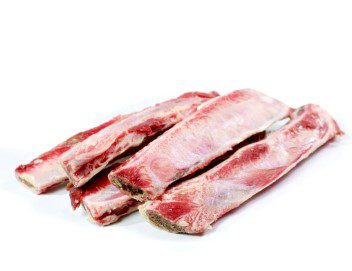

While rib bones can be a nutritious treat for dogs, there are also risks associated with giving them to your furry friend. Cooked rib bones can splinter and cause harm to your dog, so it is best to only give them as an occasional treat.
Rib bones are a great source of iron and zinc, which are essential minerals for your dog’s health. They also contain vitamin B12 and D, which keep the nervous system healthy and promote strong bones and teeth.
Cooked or raw rib bones can splinter and cause harm to your dog’s mouth, throat, and intestine. They can also present a choking hazard if they become too small. Puppies and older dogs with dental issues should avoid rib bones, and raw bones can harbor harmful bacteria.
It is best to give air-dried or freeze-dried rib bones as an occasional treat. If using raw rib bones, make sure to source them from a reliable supplier of grass-fed, healthy livestock. Always monitor your dog while they are chewing on a bone to ensure their safety.
Rib bones for dogs are an occasional treat to provide them with essential minerals like iron, zinc, vitamin B12, and D. They are also known as spare ribs and come from the rib cage of animals like cows, pigs, or sheep. Rib bones were initially used by wolves in the wild to clean their teeth and provide an excellent source of calcium. Though rib bones can offer health benefits to dogs, they come with the risk of splintering when cooked or raw, which can cause harm to their mouth, throat, and intestine. Additionally, they can present a choking hazard if they become too small. Puppies and older dogs with dental problems are advised to avoid rib bones, and raw bones can carry bacterial infections. Air-dried or freeze-dried rib bones are preferred as a safe occasional treat for dogs, and pet parents must always supervise their dogs while chewing on a bone. Alternatives to rib bones include dental chews and stuffed Kongs. Have you ever given your dog rib bones? How did they react? Share your experience with us in the comments below. Remember, moderation is key, and give your furry friend only the amount that fits their size and needs.